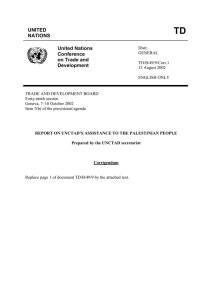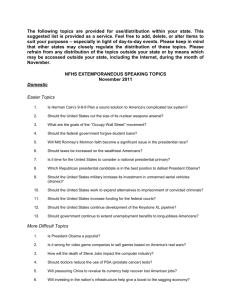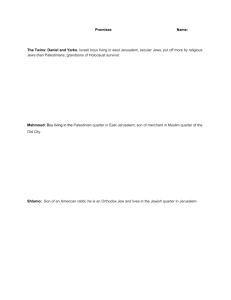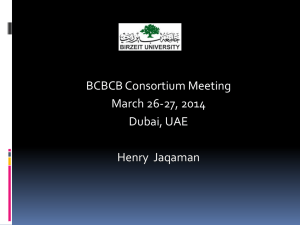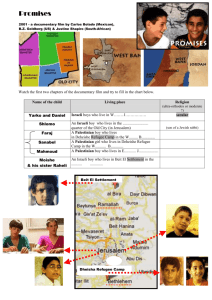SUSTAINING THE PALESTINIAN ECONOMY UNDER OCCUPATION: THE ROLE OF ARAB COOPERATION
advertisement
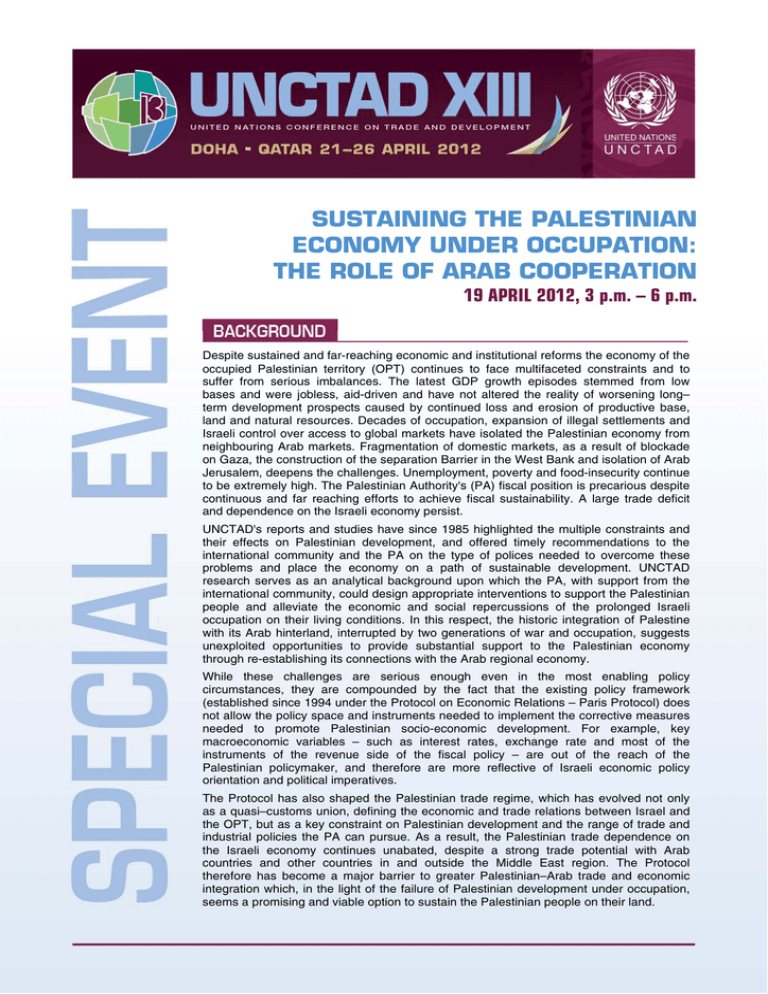
SUSTAINING THE PALESTINIAN ECONOMY UNDER OCCUPATION: THE ROLE OF ARAB COOPERATION 19 APRIL 2012, 3 p.m. – 6 p.m. Despite sustained and far-reaching economic and institutional reforms the economy of the occupied Palestinian territory (OPT) continues to face multifaceted constraints and to suffer from serious imbalances. The latest GDP growth episodes stemmed from low bases and were jobless, aid-driven and have not altered the reality of worsening long– term development prospects caused by continued loss and erosion of productive base, land and natural resources. Decades of occupation, expansion of illegal settlements and Israeli control over access to global markets have isolated the Palestinian economy from neighbouring Arab markets. Fragmentation of domestic markets, as a result of blockade on Gaza, the construction of the separation Barrier in the West Bank and isolation of Arab Jerusalem, deepens the challenges. Unemployment, poverty and food-insecurity continue to be extremely high. The Palestinian Authority's (PA) fiscal position is precarious despite continuous and far reaching efforts to achieve fiscal sustainability. A large trade deficit and dependence on the Israeli economy persist. UNCTAD's reports and studies have since 1985 highlighted the multiple constraints and their effects on Palestinian development, and offered timely recommendations to the international community and the PA on the type of polices needed to overcome these problems and place the economy on a path of sustainable development. UNCTAD research serves as an analytical background upon which the PA, with support from the international community, could design appropriate interventions to support the Palestinian people and alleviate the economic and social repercussions of the prolonged Israeli occupation on their living conditions. In this respect, the historic integration of Palestine with its Arab hinterland, interrupted by two generations of war and occupation, suggests unexploited opportunities to provide substantial support to the Palestinian economy through re-establishing its connections with the Arab regional economy. While these challenges are serious enough even in the most enabling policy circumstances, they are compounded by the fact that the existing policy framework (established since 1994 under the Protocol on Economic Relations – Paris Protocol) does not allow the policy space and instruments needed to implement the corrective measures needed to promote Palestinian socio-economic development. For example, key macroeconomic variables – such as interest rates, exchange rate and most of the instruments of the revenue side of the fiscal policy – are out of the reach of the Palestinian policymaker, and therefore are more reflective of Israeli economic policy orientation and political imperatives. The Protocol has also shaped the Palestinian trade regime, which has evolved not only as a quasi–customs union, defining the economic and trade relations between Israel and the OPT, but as a key constraint on Palestinian development and the range of trade and industrial policies the PA can pursue. As a result, the Palestinian trade dependence on the Israeli economy continues unabated, despite a strong trade potential with Arab countries and other countries in and outside the Middle East region. The Protocol therefore has become a major barrier to greater Palestinian–Arab trade and economic integration which, in the light of the failure of Palestinian development under occupation, seems a promising and viable option to sustain the Palestinian people on their land. The numerous and stifling barriers to the movement of goods and people within the OPT have fragmented the economy into isolated, disconnected islands and given rise to substantial price differentials and limited factor mobility of goods and services among them. These factors not only undermine the viability of existing businesses, but also discourage potential investment, domestic as well as foreign. The Palestinian eroded productive base and deformed sectoral structure’s adaptation to the constraints imposed with occupation takes a significant toll on the present and clouds the development horizons by the serious risk of deepening the dependence on the Israeli economy and long–lasting damage. The transaction cost inflation caused by the restrictions on the movement of Palestinian goods and people distorts market price signals and breeds inefficient resource allocation. This has created a smaller tradable goods sector and pre-empted the advantages of participation in international trade, which are especially important for a small economy such as that of the OPT. While Palestinian industrial exporters have made some inroads in recent years into regional markets, despite adversity, and Arab and regional light consumer goods are popular among Palestinian consumers, private sector cooperation offers many avenues for rebuilding a cohesive Palestinian economy. The new circumstances in the region imply that Palestinian economic fortunes may lay more across the Jordan River and Rafah borders with Arab neighbours, rather than remaining dependent on the bottleneck of trade through Israeli ports. Through the years, UNCTAD's research has highlighted and analysed the key constraints on Palestinian development, offered policy recommendations and proposed alternatives to resuscitate the economy and lay the foundation for a strong, resilient economy capable of achieving sustainable development to underpin the future, sovereign Palestinian State, in line with the relevant United Nations resolutions. In this pre-Conference event of the Conference Agenda, policymakers and economic experts will discuss the present challenges faced by the Palestinian economy under occupation and explore the range of policies needed to revitalize economic growth in the short run, ameliorate the macroeconomic imbalances, and lay the foundations for sustainable development capable of supporting the future sovereign Palestinian State. Special focus will be accorded to the role of Arab– Palestinian economic cooperation in this regard. A thematic summary of the deliberations will be prepared by the UNCTAD secretariat as part of the report of the Conference. The meeting will be webcast with excerpts posted on the UNCTAD website and available to download as podcasts. Panel discussion is conducted as an interactive dialogue where the issues will be examined from the perspective of four panellists before the discussion is opened up to questions and comments by delegates. Each Panellist will be invited to speak for 15 minutes, followed by questions and comments from the audience. 3–4:30 p.m.: Is development achievable under occupation? Short term crisis-mitigation strategies and long– term solutions 4:30–6 p.m.: The Arab dimension: what options for integration and cooperation? Issues Note to be prepared by UNCTAD secretariat (February 2012) UNCTAD(XIII)/CN/2012/8 CONTACT: Mr. Mahmoud Elkhafif, Coordinator, Assistance to the Palestinian People, (DGDS) Mr. Mutasim Elagraa, Economic Affairs Officer, Assistance to the Palestinian People, (DGDS) Ms. Randa Jamal, Economic Affairs Officer, Assistance to the Palestinian People, (DGDS)

